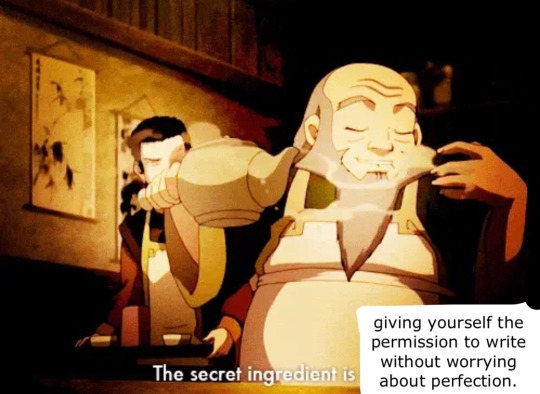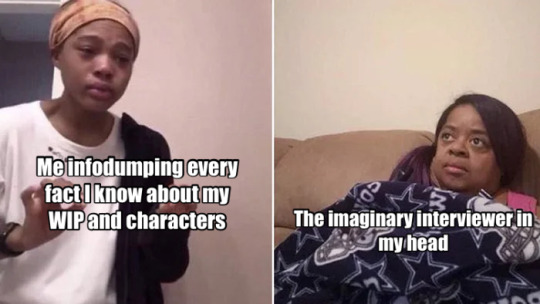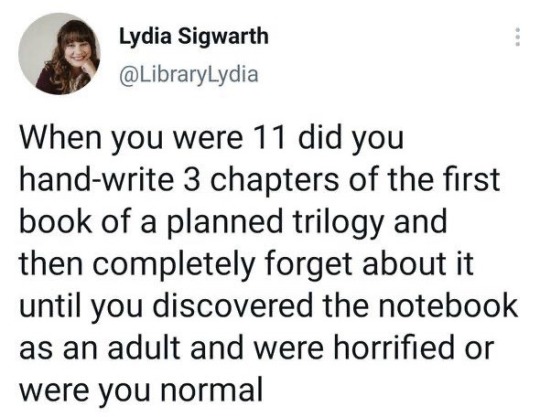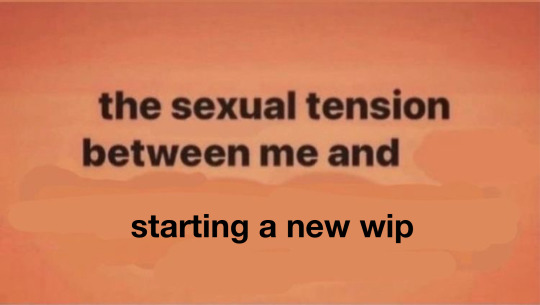A simple blog for my WIPs, ideas, and general writing advice. And memes. Mostly memes. I mean, who actually writes any more.
Don't wanna be here? Send us removal request.
Note
What is your writing advice for young people who want to write fanfiction and original stories in the near future?
If this is just Way Too Much, skip to the end (#16). My most important piece of advice is there. I also happen to think #5 is pretty good.
-_-_-_-
1) Literally just write. Write whatever you want, and do a lot of it.
_-_
2) You don’t have to post everything. In fact you don’t have to post anything. You can, don’t get me wrong, but it can be intimidating to sit down and think “I will now write something that other people will see and read and judge with their eyeballs.” Because that’s probably gonna lead to nerves and writer's block. Just write down the ideas that you have, the things you want to write, whatever’s in your brain that you want to explore and expand upon and make into something. And then if you want to, share it. Or don’t share it. I have plenty of half-baked ideas and documents and random story chapters and shit hidden away on my Google Drive that will never see the light of day, for a whole number of reasons. I wanted to write it but it wasn’t ~Spicy~ enough to warrant posting, or it’s only like an eighth of a good idea, or it’s like one scene with no story around it, or it’s just something incredibly self-indulgent I just wanted to write for my own enjoyment.
Point being, don’t write for other people. Don’t write so that other people can read it; write what you want, write for yourself, and then if you want to share it, do.
_-_
3) You can pretty much ignore any and all of these for fanfiction. In fact, you can ignore pretty much any rules or guidelines you want for fanfiction. Fanfic is a sandbox. You don’t have to be a “professional writer” to post fic. No one expects you to be Stephen King or Margaret Atwood. Fanfic is just for playing in a fandom and having fun. If you wanna write a 50 chapter slow burn with very little plot aside from the OTP slowly getting to know each other, and no real stakes or central conflict, I guarantee people would read that. Really, fanfiction is the Old West of writing: lawless, wild, unpredictable, and free.
However, here are the rules you must follow:
-Separate your paragraphs. (I’m sure you know this already, but I’m gonna say it anyway just in case.) Do not post one big block of text. Make a paragraph break when someone new is talking, when the characters are in a new place, when a new event occurs that changes the scene, when a chunk of time has passed, and when there’s a major change in subject.
-I know it’s obvious, but... grammar, punctuation, and capitalization. They exist to make writing easy for readers to read, and more people will read your stuff if they don’t have to stop and try to figure out what you meant.
-Use tags and labels, as is possible with whatever site you’re using. Especially if you include possibly triggering content in your story. Again, I know it’s obvious, but it’s common courtesy. Bonus: tagging the themes and content of your story helps readers find it and read it :)
-If possible, limit the use of all-caps and exclamation marks / question marks. 99% of the time, one ! or one ? will do. If you overload the page with a lot of all-caps and long rows of exclamation marks or question marks, it hampers readability.
... That’s literally all I can think of. And, like I said, it’s all pretty basic stuff. You were probably rolling your eyes like, “Uh, yeah, Gwen, I know.” But that’s literally it. You can pretty much do whatever you want in fanfic.
That being said, here’s my advice for both fanfiction and original work...
_-_
4) A quick and dirty rule for coming up with a plot, starting a story, keeping up pacing, or maintaining tension: figure out what dreams, desires, and goals are nearest and dearest to your main character’s heart (see #16). Then set up the main conflict to be directly in opposition to that goal. It doesn’t have to be in a tangible way, though it could be. But, if your main character wants more than anything to reach the ships on the southern coast of your world and sail to a new life, make sure the main conflict immediately prevents them from doing that - in fact, make sure to send them north. If your main character just wants to keep their loved ones safe, kidnap the loved ones. If your main character just wants to date their best-friend-turned-crush, make sure they think they have no chance - or, make them cocky about it, and make sure it makes Person B determined not to ever like them. You get it. Figure out what your character most wants, and then keep them from having that. Boom - your conflict now ties in with your character's motivation. It's like instant yeast for plots.
_-_
5) If you’re anything like me, you want your first draft to be Good, despite all that advice about how the first draft doesn’t have to be good and it’s just to get words on the page, yadda yadda. And if you’re somewhat of a perfectionist (like myself), it’s easy to get stuck looking at a blank page because you don’t have The Perfect Words, and you want what you write to be Good the first time.
Here’s how I cheat that:
Instead of trying to write a Good First Draft from a blank page, hit the enter key a few times, skip a little down on the page, change your ink to red (or blue, or whatever - just something immediately identifiable as Not Black) and just thought vomit. Write whatever the hell you’re thinking, exactly as you think it. Don’t worry about it being readable, don’t worry about narrative flow for now, don’t worry about covering all the details, don’t worry about anything except either a) getting all the details of your idea out onto the page, whether that’s a lot or whether it’s just a sentence or two, or b) if you don’t have an idea yet, finding your way there.
Because this method is also very good for finding your way to ideas when you’re stuck in writer’s block.
Because of how human brains work, getting this stuff out onto the page - in all its messy, stream-of-consciousness glory - will likely spark more thoughts. As you write your original idea about the scene, it’ll likely spark more ideas. Creation begets creation. If you just start thought-vomiting your ideas onto the page, chances are you’ll think of more things as you go, and you’ll start filling out description or dialogue or tone or action or whatever, and pretty soon the scene starts writing itself.
Not sure where you’re going with the scene or which ideas you wanna use? Use a lot of ambivalent language in your “thought-vomit draft.” My pre-writing notes are chock-full of the words “maybe,” “perhaps,” and the phrases, “At some point...” and “...or something like that.” In this way, I don’t tie myself down to one idea; it’s just an idea, and I’m keeping it on the page in case I use it, but I might chuck it in the trash or change it or whatever.
And then, once your ideas for the scene (or story, or chapter, or whatever) are on the page, then go back to the top and start translating them into a “real” first draft. Use black ink, and start copy-pasting chunks of the thought-vomit up into the top part of the document and translating them into Draft 1. Separate out paragraphs where paragraph breaks should be. Add the correct punctuation and whatnot. Change “describe the lobby here - include potted plants, fancy carpet, blood stain, etc.” into an actual description of the lobby. Flesh it out, or condense, or whatever it needs. And if you’re still stuck, change back to red ink and ramble some more until you find a path that feels right, then plug that in. This keeps you from looking at a blank page, and it allows you to generate a kind of Draft 0.5, somewhere between a plan and a first draft.
You don’t have to use every idea. Like I said, jot down whatever comes to mind, put a “maybe” before or after it, and keep working. If the idea grabs you and you wanna keep expanding on it and exploring it, cool. If you just wanna jot it down so you don’t forget it and then move on, also cool. Red-ink draft / “thought-vomit draft” is your time to jump around in the timeline, add or finesse details at whatever point your brain moves to, etc. Don’t try to do it exactly in story order, because you will get tangential thoughts and ideas, and you will not remember to write them down five pages later when you finally get to taking notes on that scene. Trust me. On that note...
_-_
6) Write everything down the moment you think of it. Seriously.
“I’ll remember it when I get around to writing that scene in a couple days / weeks / months (/years).”
You won’t.
Write it down.
Phone, journal, google docs - hell, my family regularly laughs at me for grabbing a napkin during dinner and scribbling thoughts down alongside pasta sauce stains.
And then, once you have it written down somewhere...
_-_
7) Consolidate your writing ideas in one place.
Maybe this isn’t really your style, and that’s totally chill.
Buuuut, if you’re Type-A like me - or if you tend to be somewhat unorganized and you know you’ll lose track of your writing notes if they’re scattered across multiple notebooks, journals, napkins, phone notes, etc. - having one consolidated document of notes is a life saver. I keep mine on Google Docs so I can access it, add to it, and look through it for inspiration anywhere at any time. When I have one of those Shower Thoughts that I jot down on my phone or on a napkin during dinner, I set myself a reminder on my phone to type it up in my Story Ideas document later.
(Or, if the idea I had was for a story of mine that I’ve already started planning / drafting / whatever, I put it in the document for that story instead of the Big Random Story Ideas doc. You get it.)
_-_
8) Have other ways to collect and save writing ideas, besides just writing stuff down. If you like Pinterest, make pinterest boards of your characters or stories or settings or whatever. If you’re big into playlists, make a playlist for your character / setting / story / etc. Or both. Or something else. I’m not good at drawing, but maybe you are, and maybe you like to draw your ideas. Whatever form it takes, having another way to save ideas and think about your stories is invaluable.
_-_
9) Some writers can just start writing with no idea where the story is going, and they just kind of figure it out as they go. I envy those writers. And I do that sometimes for fanfiction, where the stakes are somewhat lower and the audience is reading more for scene-to-scene enjoyment (and to see their OTP kiss) than for a Driving And Compelling Narrative.
But here’s the thing: especially if you’re just kind of starting out, writing without some sort of plan is really, really hard, and will likely lead you into a slow, meandering narrative that will likely frustrate you.
Even if you think you’re someone that just can’t write with a plan (and again, I have the highest respect for pansters out there - I don’t know how you do it, you crazy bastards, but you keep doing you) - even if you think “I can’t work with plans, they’re too prescriptive, I just want to write and see what happens -”
Try at least making the most skeletal of plans.
Even if you have no clue what 90% of the story is, yet. That’s fine. But you need to have some idea of what you’re building to, even if that’s nothing more specific than a feeling, or a turning point for your character. Even if your entire plan for everything beyond Chapter 1 is, “At some point, Charlie needs to realize that Ed was lying to her.”
This is where those Draft 0.5 notes come in handy. Because, more than likely, working on your current scene that way will spark ideas for later scenes, which you can put down at the bottom of the document and save for when they become relevant. In my experience, the line between planning ahead and making a Draft 0.5 is exceptionally thin. One can quickly turn into the other.
If you’re really, really resistant to the idea of planning ahead, that’s okay. It’s not everybody’s style. But for the love of all that is holy, write down your ideas for future scenes, even if you’re a person that doesn’t like to plan and writes only in story order, because you will not remember that idea once you get to that scene.
_-_
10) You don’t have to write in order.
Here’s the thing: I’m a person that can only do my Draft 1 in story order (meaning, chronological order). I just have to be in that flow; I need to write in story order for me to best channel where the character is at from scene to scene, both narratively and emotionally.
But my Thought Vomit Draft is another thing entirely. By using the brain hack of putting my notes in red (or another color, it doesn’t matter) and going down to the bottom of the document / page and taking notes there, and then integrating them into whatever plan I have, and then translating them into Draft 1 once I get there in the story - by doing that, I can get my good ideas onto the page (and expound upon them and let my muse carry me and ride that momentum while I’m in the moment of inspiration) without writing out of order.
Maybe that’s just me. But if you’re a person who really prefers to write in story order, that could be hugely helpful to you. It is to me.
_-_
11) Emotion and motivation will do more for your story than technicalities of plot.
If your characters really care about something, and their journey through the (shaky or weak) plot is emotionally engaging, it will be a much more compelling story than a story with a “perfect” plot and unrelatable or unmotivated characters.
If your characters care about what they’re doing, and it means something to them, and their goals and actions are driven by dreams or fears or emotions that are integral to who they are, your audience will care too. If you have a perfectly crafted plot that hits all the right beats and has high stakes and fast pacing and drama - but your characters don’t connect with what’s happening in a way that’s deeply meaningful or emotional for them? You’re gonna have a hard time engaging readers.
When in doubt, prioritize character emotion and motivation over plot. Emotion is what drives story.
This power is highly exploitable. (Just look at pulp novels and shitty but entertaining movies.) You can even use it to glaze over plot holes or reinvigorate a limp narrative. Use it that way sparingly, though. It’s a band-aid, not a surgery.
_-_
12) Evil villains are hard to write - mostly because there are very few truly evil people in the world. (There are a few. Billionaires and several big name politicians come to mind.) But by and large, there aren’t that many evil people. There are plenty of bad people, but bad people have some good in them, somewhere in there. Trying to write an evil villain is hard, because they often turn very cartoony.
Here’s a tip: it’s much easier to write antagonists who aren’t evil. Even if they’re bad people. Of course, there’s no reason you can’t write a villain that’s just truly evil - a serial killer, or an abuser, or a billionaire, or someone who legit just wants to hurt people or blow up the earth or stay in control of an oppressed population, or whatever. But chances are, it’s gonna be really hard to make them feel real, and even harder to create a plot around them that doesn’t feel forced or contrived.
Instead, try writing an antagonist / villain whose motivations and goals directly clash with your protagonist’s - but not because they want to take over the world or see people suffer. Write an antagonist who’s chaotic good, but whose perception of the situation is completely opposite from your hero’s. Write an antagonist whose only desire is to save people, and who will do anything to achieve that goal - anything. Write an antagonist who believes in the letter of the law, and will hinder and oppose the hero’s methods even if they agree with the hero’s motivation. Write an antagonist who got in way over their head and did some things they regret, and now they don’t know how to get out, and they’re doing their best but whatever they set in motion is too powerful for them to stop now.
Write villains who are human. Write a killer who thought they were doing the right thing by taking their victim out of the equation, who vomits at the sight of the body and sobs over the grave they dig. Write a government leader who truly believes she’s doing what’s best for her people in the long-term, even if it might hurt them in the short term, and is willing to endure the hatred and belligerence of the masses if it means securing what she thinks is a better future for her people. Write a teenage bully that thinks they’re the one being picked on by the world, and they’re just fighting back, standing their ground. Write a scientist who will break any code of ethics and hurt anyone he needs to - in order to bring back his baby sister from the grave, because he promised her he’d protect her and he failed. Write an antagonist who is selfish and self-centered and capricious - because in order to survive they had to look out for Number One, and that habit ain’t about to break anytime soon.
Write villains who aren’t even villains. Write antagonists who oppose the hero because of moral differences. Write antagonists who are trying to do the right thing. Write antagonists who treat the heroes with kindness and dignity and respect and gentleness.
They don’t have to be good. They don’t have to be Misunderstood Sweethearts who “deserve” a redemption arc. They can be cruel and nasty and dismissive and callous and violent and etc. etc.
Just hesitate before you make them Evil-with-a-capital-E. Because evil is hard to write, and honestly, boring to read. Flawed human beings with goals and motivations that directly oppose the main characters’ are much easier to write and much more interesting to read.
Ask why. Why is your villain trying to take over the world? What does that even mean? Are they trying to create a Star-Trek-like post-capitalism utopia, but they know that won’t happen in a million lifetimes, so they’re trying to do it by force? Are they actually super in favor of human rights, but they got very impatient waiting for the world to do anything about poverty and war, so they decided to take it into their own hands? Are they determined to fix the world - no matter the cost? Are they terrified and overwhelmed, but committed to see it through to the end? Or - maybe they’re just doing it on a dare. Maybe they don’t really give a shit about world domination, they were just a mediocre rich white guy who decided to fuck around and find out, and now he’s kind of curious how far he can take this thing. And now he’s kind of an internationally-wanted criminal, so he’s kind of stuck living on his hidden private island in his multi-billion dollar secret base, strapping lasers to sharks’ heads for the hell of it. Gross, selfish, uncaring, and dangerous? For sure. Evil? Depends on your definition. See, now we’re getting somewhere.
_-_
13) It’s tempting to let the plot control the characters. It’s easy to drop your characters into a situation and see how they react. But here’s the thing: that doesn’t drive plot. In fact, it bogs down pacing. Instead, try to build you plot off of your characters’ actions and decisions. Let your character build their own situation. Not to say it should go they way they wanted it to go; in fact, usually, their grand plans should go to hell very quickly. But having the characters take action and make decisions, and letting the plot develop based on that, is much easier to make compelling than making a rigid series of events and then trying to herd your characters into them.
_-_
14) Having trouble justifying a character’s actions? Consider having them make the opposite decision, or having them approach the situation in a different way. For example: you need your character to go meet the bad guy, for plot reasons, even though there’s no way it’s not a trap. If the character goes, readers are gonna be groaning with their head in their hands, because c’mon man, that was really fucking stupid. But he’s gotta go, because the plot needs that. Two ways you might handle this: a) He knows it’s probably a trap. He decides not to go. The plot conspires to get him near the villain anyway. Or, b) He knows it’s a trap. But he needs to go, for (insert reasons here). So, he approaches it in an unexpected way. He brings backup, recruiting a side character we met earlier in the story. Or he arrives on the back of a dragon, because ain’t nobody gonna fuck with a dude on a dragon. Or he goes - early, and ambushes the villain. It may work, it may not. He may get himself kidnapped anyway. But it moves the plot along without having Stupid Hero Syndrome.
_-_
15) This is a legit piece of advice: if all of this sounds overwhelming, literally just ignore it and write what you want. For real. Writing should be fun, and every single writer operates differently. If you’re sitting here like “I’m getting stressed just reading this,” just flip me a good-natured bird and get on with your life. I promise I won’t take it personally. Same goes for literally any other writing advice you see. Lots of rules and guidelines can very quickly make anything thoroughly un-fun. Just write. If you’re passionate about it and you do it for long enough, you’ll start figuring out the tips and tricks on your own.
_-_
16) Here’s the best piece of advice I can give you: know your characters. More importantly, know what’s important to them. Build their personality and decisions off of that, and build your plot off of their decisions.
I see a lot of character building sheets that ask a shit-ton of questions like “What’s their most prized possession?” “Do they like their family?” “What’s their favorite food?”
And while these are good questions, my problem with this type of character building is that if you start there, with the little stuff, you’re building on nothing. IMO, to make a truly strong character (not strong like Inner Strength, strong like effective), you need a strong foundation.
Here are the things you must know about your character:
a) What are their greatest fears / deepest insecurities? And I don’t mean “wasps” or “heights.” I mean the deep shit. I mean fears like “living a meaningless life,” or “turning out just like their parents,” or “that no one will ever love them,” or “being powerless.” You may say, “But they’re really scared of wasps! They fall into a wasp nest when they were little and got stung so much they almost died!” Great! That’s a fantastic bit of backstory. They should absolutely be afraid of wasps, and that should absolutely be an impediment later in the story. But dig deeper. What about that event actually scarred them? Was it the helplessness? Stumbling around, swatting at the air, not being able to do a single thing to stop what was happening to them? Was it that they were alone, and no matter how loud they screamed, no one was coming? Was it the bodily horror of feeling themself turn into an inhuman creature as they swelled up from the stings, unable to move their fingers or face normally anymore?
And don’t forget insecurities, because those factor in, too. Are they deeply insecure about their identity? Do they believe, deep down, that they’re ugly? Did they grow up poor and they’ve always been really touchy about that? Why? Dig deep. Figure out what really, really bothers them.
b) What are their hopes and dreams? What do they truly want out of life? What do they consider the most valuable to their experience here in this thing called life? Is it the freedom to forge their own path and be independent? Is it the approval of their family or peers? Is it a home? Is it knowledge, or understanding? Spiritual fulfillment? Is it deeply important to them that they contribute to their community, or protect those they love? What do they need in order to feel truly and deeply fulfilled in life?
Figure out those two things (each one encompasses several things, btw, you don’t have to stop at just one for each), and then use that to inform how they behave and the types of decisions they make within the story.
It also informs character behavior and personality.
Let’s say we have a character who’s afraid of helplessness. They’re probably gonna be the person that always wants to do something, try something, no matter how hopeless the situation seems. They’d despise just sitting and waiting, probably, because it makes them feel powerless. They might even be the person that makes rash decisions and acts impulsively and puts themself in danger unnecessarily, because in their mind it’s better than being at the mercy of fate. This is one way you could use a character’s personality to inform their decisions, which in turn helps to inform plot.
Or, let’s say we have a character whose greatest fear is being left behind or forgotten. We may have a chatterbox on our hands. They might be obnoxious. They might love the spotlight, constantly vying for attention no matter the situation, because deep down they’re so afraid that they’d be forgotten otherwise. Or, it may go the opposite way. They may be so afraid of people leaving them that they’re terrified of bothering people. They don’t want to do anything that could annoy people, anything that might give people a reason to leave them. They might be exceedingly polite, quiet, accommodating. A push-over, really.
These are two nearly opposite types of personalities, both stemming from the same core fear/insecurity. You can go a lot of different ways with it. But if you build on that strong foundation, you’ll have a strong character, and a stronger plot.
Likewise, the structure of your story can and should inform the design of these character traits. If you need your characters to team up near the end, it may be impactful if you give your main character a deep fear of commitment, an insecurity about being unwanted or left behind, and make them highly value independence and freedom. That could make their team-up for the final battle very meaningful. Conversely, you can use your character’s deepest fears and desires to help design the plot. Is your character deeply insecure about voicing their opinions or taking a stand, because of trauma they faced in the past? Make them face that. Build that into the climactic third act. Give them the big inspirational speech where they stand up and talk about what they believe to be important, what they think the group should do. And then design that character arc to run through the story, giving you more handholds and stepping stones, more pieces of foundation on which to design the plot.
In this way, character should inform story as much as story informs character. It’s a feedback loop.
Bonus: if you build your character and your plot off of each other in this way, it automatically starts to build in the foundations of that emotional investment I mentioned earlier. If your character’s decisions are based on what they most want and do not want in life, you basically have your character motivation and stakes pre-built.
Note: you need to know these things about your villain, too.
-_-_-
I’m genuinely sorry about the length of this, lmao. But you did ask.
Best of luck!
Edit: I forgot an important one:
17) Start when the scene starts and end when the scene ends.
What do I mean by that?
If your notes say “Danny asks Nicole out after school and majorly flubs it,” start the scene when Danny approaches Nicole after school. Better yet, cold-open the scene on “I was wondering if, you know, you’d wanna. You know. Hang out some time?”
Don’t start that morning when Danny goes to school, unless you’re gonna cover the school day in like one or two sentences. Don’t spend whole paragraphs going through the school day, unless it’s to cover other plot points first (in which case apply these same guidelines there), or if the paragraphs are there for a specific reason, like to illustrate how stressed he is and how it seems like every little thing is going wrong. Even then, trim the fat as much as possible. Expounding and describing everything Moment-to-moment is for the meat of the scenes, not the leading-up-to and coming-away-from.
Here’s my rule of thumb: study how and when movies cut from scene to scene. Movies have exceptionally strict, limited time for storytelling; they’re excellent examples of starting a scene when the plot point starts and ending when it’s over. If you can’t picture a movie showing everything you showed, start the scene later and end it earlier.
731 notes
·
View notes
Text
working on a new wip is all fun and games until you have to start naming things
131 notes
·
View notes
Text
am convinced that writers who write characters with "flawless pale white skin" have never actually met a pale white person? the lack of pigment means you can see every follicle, vein, razor bump, and weird random flushed patch
3K notes
·
View notes
Text
bitches be like "these are my comfort characters!" and it's a group of murderers
105K notes
·
View notes
Text
Me on my day off like:
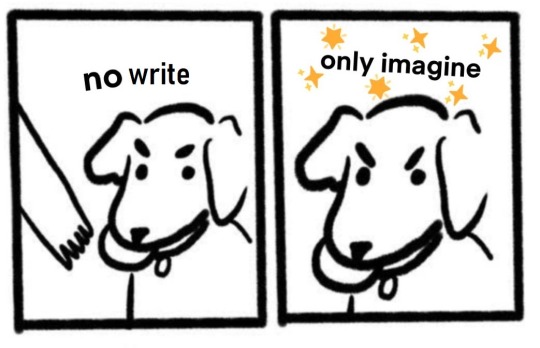
Is this writer’s block or am I just tired? Or both?
2K notes
·
View notes
Text
Me: Opens document with unfinished writing
Me: Yep, it still exists *closes document*
17K notes
·
View notes





